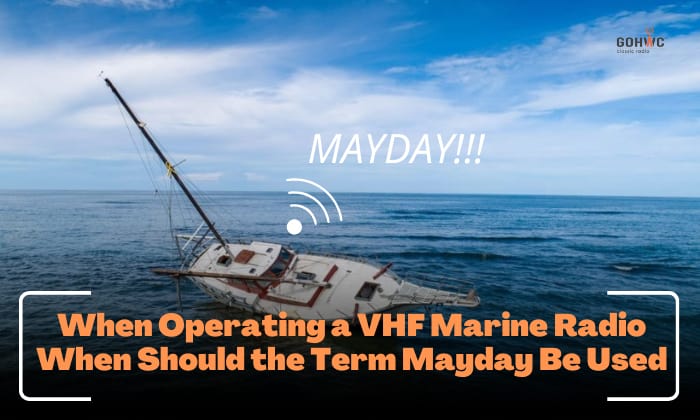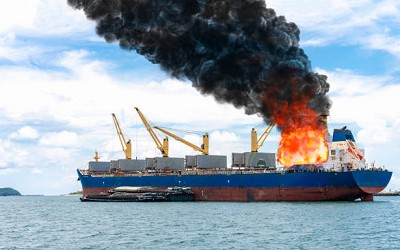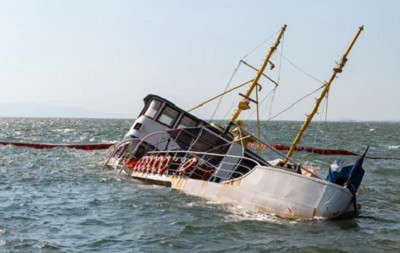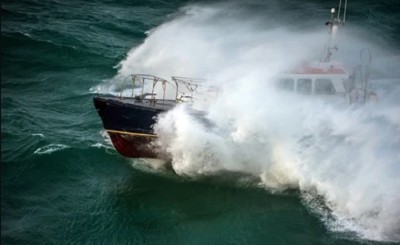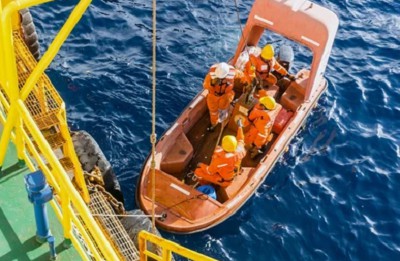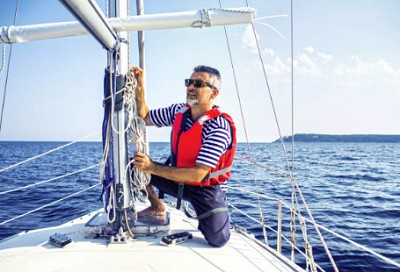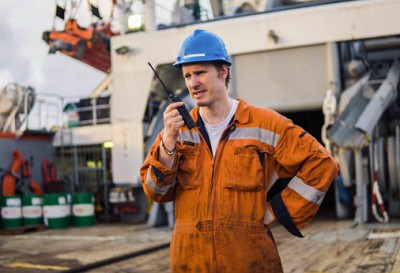VHF emergency channel for radios are crucial for boaters and marine professionals, allowing them to communicate with other vessels in case of emergencies.
However, operating your vessel with a VHF radio and knowing when to use a terminology like Mayday is a requirement to guarantee a prompt reaction from the US Coast Guard or other rescue services.
So, when operating a VHF marine radio when should the term mayday be used?
Continue reading this article, and you’ll know that an uncontrollable fire on-board, capsizing, a vessel being stuck in adverse weather, and medical emergencies are the main four conditions for the US Coast guard to immediately jump into action.
If these conditions are not met, an alternative to Mayday call is necessary.
Contents
The Four Main Life-threatening Situations to Use a Mayday Call
The distress signal “Mayday” is the most urgent call that requires immediate help. It should only be used in situations where there is a grave or imminent threat to the safety of a person or a vessel, and assistance is necessary to protect the life of the people on board.
The following are four common situations that qualify for this boat emergency radio call.
1. Uncontrollable fire on-board
Fire extinguishers are available on boats to put out flames, whether they’re caused by oil leaks, faulty circuits, or cigarette smoking. However, if a fire is already growing and becoming impossible to control, putting it out yourself is not advisable, and having a Mayday call is essential.
2. Boat is capsizing
If you notice that your boat is overturning and you cannot do anything to stop it, immediately make a Mayday call. Boat capsizing is dangerous because it can result in hypothermia or drowning.
3. A ship caught in stormy weather and acquiring water
Weather is hard to predict accurately and poses lethal risks to boaters, especially those who travel long distances on the ocean. A marine radio emergency channel like Mayday should be used by boaters to immediately call for help in this case.
4. Medical emergencies
Seasickness is among the mildest conditions one can experience while boating. Sometimes, mariners will deal with much more severe, potentially fatal injuries. If the emergency is already beyond the control of the people on the boat and there is a lack of equipment available to address the situation, a Mayday call is needed.
The Importance of the Term “mayday”
You might be asking, “where does the term mayday come from?” or “why is it important?”
A quick history about this is that it originated in the 1920s from the French phrase “m’aider,” which means “help me.” This term serves significant importance as it is an internationally recognized distress signal that is used to indicate a life-threatening emergency.
The use of this term enables quick and effective responses from rescue services, ensuring the safety of those in distress. However, it should only be used in situations of severe trouble, such as when a vessel is at risk of sinking or when there is a threat to human life.
Additionally, it is every boater’s unwritten rule to monitor the distress channel on their radio while sailing. And, what channel must you monitor? It’s channel 16.
You can use it to save your life as well as others on your boat by making Mayday calls.
Things to Consider When Using a VHF Marine Radio
1. Wear PFDs
Aside from staying calm and being clear-headed when conducting a Mayday call, make sure that you and your fellow boaters are wearing personal flotation devices (PFDs) to be ready for evacuation, especially for extreme cases like an uncontrollable fire.
2. VHF radio setting
When using a VHF radio, its settings may vary depending on usage. For example, the radio’s coverage is relative to the height of the antenna and its power.
However, within unusual events like emergencies, you may adjust these devices beyond their normal range by increasing the wattage. Doing so is particularly useful, especially in areas where there is poor signal reception.
3. Monitor channel 16
Monitoring channel 16 is a way of helping a possible emergency to be solved. You may opt to help the vessel that’s asking for assistance by being quiet and listening carefully. You may also write down the details of the situation as to who, where, what, and other important things that may help the rescuers.
Tips to Make a Mayday Call
1. Stay calm and use the radio properly
It’s important to stay calm and speak clearly to ensure that your message is understood. Then look for your radio’s distress button and hold onto it until it beeps.
2. Observe the correct format
Repeat the phrase “Mayday, Mayday, Mayday” three times, as this is the standard Mayday call to indicate an emergency.
3. Give all the important details of the situation
| Who | Provide the name of your boat. |
| Where | Give the precise location of your boat. |
| What | Describe the problem that’s happening. |
| Kind | Specify what type of support is needed. |
| Number | Determine the number of people onboard and the number of boaters injured. |
| Seaworthiness | Have a more specific and detailed description of the situation’s damages and injuries (e.g. how much of the boat is on fire). |
| Description | Let the rescuers know the details of your boat (e.g., manufacturer, type, and age). |
4. Follow instructions
Keep your radio on and if possible, aside from following instructions, keep the rescuers updated.
The Consequence of False and Accidental Mayday Calls
Because of the rampant false Mayday calls the Coast Guard receives, there is a strict regulation when using this distress hotline. Know that it takes a lot of resources to prepare for and respond to cases that qualify for this emergency, so when a false call is carried out, the following are the possible consequences.
- Maximum six years in prison
- Criminal fine of $250,00
- Civil fine of $5,000
- Compensation for the expenses related to a frivolous call.
So, if you know that the situation you are in is not immediately life-threatening, use the most common alternative to mayday, which is Pan-pan, to avoid the penalties above.
Frequently Asked Questions
Mayday vs Pan Pan: what’s the difference?
Mayday and Pan-Pan are both radio distress calls used during emergencies. The difference between them lies in the level of urgency and severity of the situation. Communications that use Pan Pan mean coast guard are less needed compared to Mayday calls.
Specifically, Mayday is reserved for the most severe emergencies that require the most urgent response, such as when there is an immediate threat to life, vessel, or equipment.
Pan-Pan, on the other hand, is an alternative signal to Mayday that is used in potentially dangerous situations that require immediate attention but are not yet life-threatening.
If I accidentally made a Mayday call, what should I do?
Immediately contact and inform the Coast Guard that you accidentally made a Mayday call, and explain what happened. You can cancel the distress call by contacting them through various means such as VHF-FM Channel 16, or via mobile at (855) 406-USCG (8724).
Conclusion
So, when operating a VHF marine radio when should the term mayday be used? The most common conditions are the emergency VHF radio communication examples mentioned above.
Know that the emergency you are in needs to be quickly assessed, so you can describe the situation to the authorities. Be it Mayday or Pan Pan, always make sure that you know the distinction between the two to avoid further complications.

Hello! I am Hart, the content writer and editor here at G0HWC. I used to be in the same local radio club with Howe, and he convinced me to join him in spreading my love for the radio with others. With a background in radio studies, I spend every day crafting accurate, easy to read content on various topics related to owning and using radios. I hope that my content can help you confidently venture in your radio journey!

